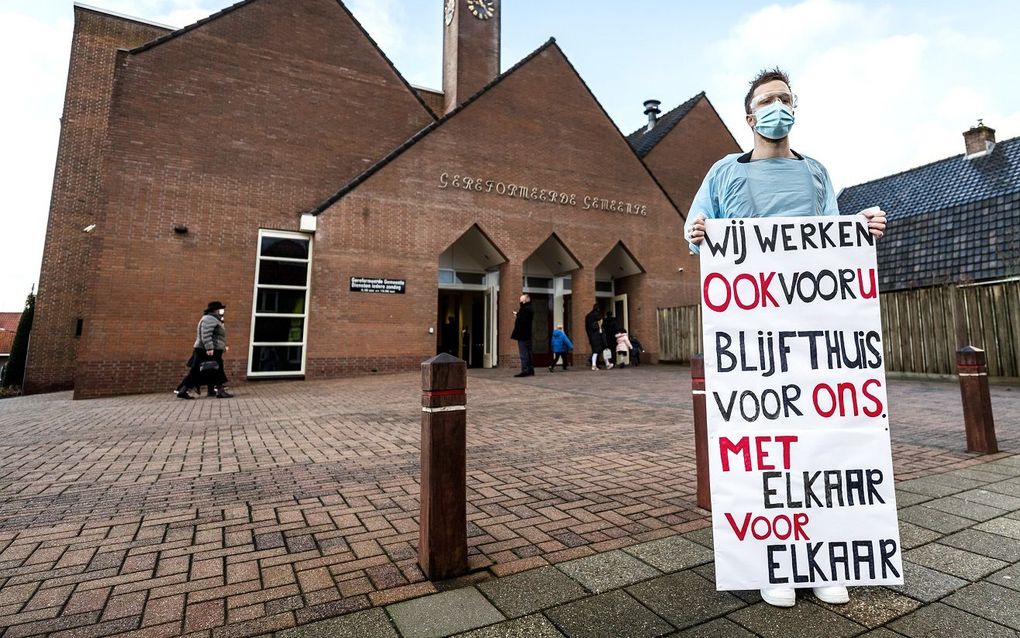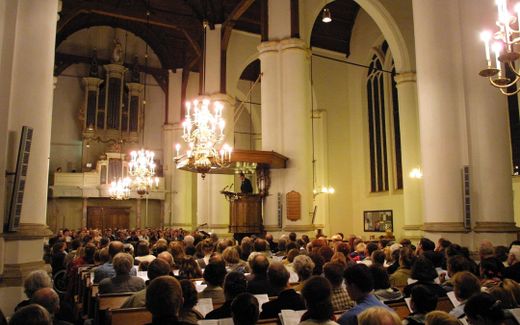Most Dutch citizens do not believe in God anymore

A Dutch nurse demonstrates during the corona pandemic against people going to church. His board reads: We also work for you. Stay home for us. With each other for each other. Photo ANP, Remko de Waal
Western Europe
The Netherlands is one of the most secular countries in the world. The majority of the population calls themselves atheist or agnostic.
About 70 per cent of the population no longer believes in God. That is pointed out by the research of the Dutch Sociaal en Cultureel Planbureau (SCP), according to the Nederlands Dagblad. The SCP report shows that 52 per cent of the 4000 respondents call themselves atheist or agnostic. Another 16 per cent orientate themselves in modern spirituality. Only 33 per cent of all the Dutch believes in God.
The SCP expects that the process of secularisation will continue. “People who are interested in modern spirituality often have been raised religiously”, researcher Willem Huijnk says to the Nederlands Dagblad. He points out that the youngest generation, on the other hand, has not been raised with religion at all. Therefore, these children have no affinity with faith at all. “They will, as we expect, sooner become agnostic or atheist.”
Yet, this effect is not all the way sure. Some analysts suggest that the unfamiliarity of the youngest generation with faith could be seen as open-mindedness. That could create chances for “religious revitalisation”, the SCP states in the report.
According to the SCP, Christianity is no longer the “influential, social factor and the axis of the personal lives of families as it was before”, the Reformatorisch Dagblad confirms.
Dangers of secularisation
The newspaper writes that the secularising process has negative consequences for the stability of Dutch society. It points out that the gap between orthodox believers (Christians and Muslims) and the rest of society has grown. That can lead to tensions. These tensions, for example, could be seen during the Covid pandemic. Secular people did not understand why orthodox Christians still came together for worship services.
In addition, the SCP researched how non-religious people give meaning to their lives. The conclusion is that these people do not seem very interested in that matter at all. Atheists and agnostics have to give meaning to their own life because “life, in general, is quite meaningless”, as one of the respondents said. According to the researchers, the fact that atheists and agnostics have to give meaning to their own lives can lead to a heavier mental load and an increased number of burn-outs.
However, this does not mean that these people are unhappy per definition. Instead, they try to create meaning for their personal lives. They do so, for example, by taking care of others, developing themselves, and enjoying unique experiences. According to the researchers, many people do not really think about the meaning of their lives.
The disinterest of non-believers in religion makes it hard for Christians and Muslims to reach out to them. The few religious communities, such as the Dutch Biblebelt, Muslim communities and immigrant churches, do not succeed in making people curious or convincing them to join a religious group.
Related Articles






